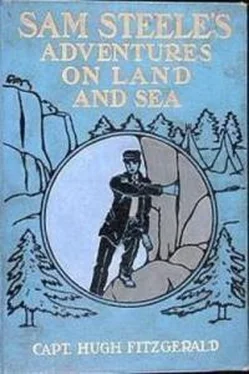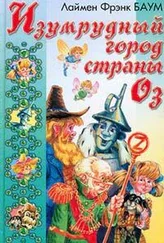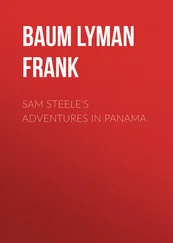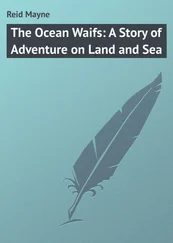“But we are not miners, Uncle; and it’s bitter cold up there, they say.”
“Well put. We’ll let the crowds mine the gold, and then hand it over to us.”
“I’m afraid I don’t understand,” said I, weakly.
“No call for you to try, Sam. I’m your guardeen, an’ so I’ll do the understandin’ for us both. Folks has to eat, my lad, an’ gold hunters is usually too excited to make proper provisions fer their stomachs. They’re goin’ to be mighty hungry out in Alaska, before long, an’ when a man’s hungry he’ll pay liberal fer a square meal. Let’s give it to him, Sam, an’ take the consequences—which is gold dust an’ nuggets.”
“How will you do it, Uncle Nabe?”
“Load the ‘Flipper’ with grub an’ carry it to Kipnac, or up the Yukon as far as Fort Weare, or wherever the gold fields open up. Then, when the miners get hungry, they’ll come to us and trade their gold for our groceries. We’re sure to make big profits, Sam.”
“It looks like a reasonable proposition, sir,” I said. “But it seems to me rather dangerous. Suppose our ship gets frozen in the ice, and we can’t get away? And suppose about that time we’ve sold out our provisions. We can’t eat gold. And suppose——”
“S’pose the moon falls out’n the sky,” interrupted Uncle Naboth, “wouldn’t it be dark at night, though!”
“Well, sir?”
“If the gold–diggers can live in the ice fields, we can live in a good warm ship. And we’ll keep enough grub for ourselves, you may be sure of that.”
“When do we start?” I asked, feeling sure that no arguments would move my uncle to abandon the trip, once he had made up his mind to undertake it.
“As soon as we can get the cargo aboard. It’s coming on warmer weather, now, and this is the best time to make the voyage. A steamer left today with three hundred prospectors, an’ they’ll be goin’ in bunches every day, now. Already I estimate there’s over a thousand in the fields, so we won’t get there any too soon to do business. What do you say, Sam?”
“I’ve nothing to say, sir. Being my guardian, you’ve decided the matter for both the partners, as is right and proper. As your clerk and assistant, I’ll obey whatever orders you give me.”
“That’s the proper spirit, lad!” he cried, with enthusiasm. “We’ll go to work tomorrow morning; and if all goes well we’ll be afloat in ten days, with a full cargo!”
On the seventh day of May, 1897, the “Flipper” weighed anchor and sailed before a light breeze through the Golden Gate and away on her voyage toward Alaska and its gold fields. Stored within her hold was a vast quantity of provisions of the sort that could be kept indefinitely without danger of spoiling. Flour, hams, bacon, sugar and coffee were represented; but canned meats and vegetables, tobacco and cheap cigars comprised by far the greater part of the cargo. Uncle Naboth had been seriously advised to carry a good supply of liquors, but refused positively to traffic in such merchandise.
Indeed, my uncle rose many degrees in my respect after I had watched for a time his preparations for our voyage. Simple, rough and uneducated he might be, but a shrewder man at a bargain I have never met in all my experience. And his reputation for honesty was so well established that his credit was practically unlimited among the wholesale grocers and notion jobbers of San Francisco. Everyone seemed ready and anxious to assist him, and the amount of consideration he met with on every hand was really wonderful.
“We’ve bought the right stuff, Sam,” he said to me, as we stood on the deck and watched the shore gradually recede, “and now we’ve got to sell it right. That’s the secret of good tradin’.”
I was glad enough to find myself at sea, where I could rest from my labors of the past two weeks. I had been upon the docks night and day, it seemed, checking off packages of goods as fast as they were loaded on the lighters, and being unaccustomed to work I tired very easily. But my books were all accurate and “ship–shape,” and I had found opportunity to fit up my little state–room with many comforts. In this I had been aided by Uncle Naboth, who was exceedingly liberal in allowing me money for whatever I required. At one time I said I would like to buy a few books, and the next day, to my surprise, he sent to my room a box containing the complete works of Walter Scott and Robert Louis Stevenson, with a miscellaneous collection of volumes by standard authors.
“I don’t know much about books myself, Sam,” he said; “so I got a feller that does know to pick ’em out for me, an’ I guess you’ll find ’em the right sort.”
I did not tell him that I would have preferred to make my own selection, and afterward I frankly admitted to myself that the collection was an admirable one.
By this time I had come to know all the officers and crew, and found them a pretty good lot, taken altogether. The principle “characters” aboard were the dismal Captain Gay, who was really as contented a man as I ever knew, Acker, the ship’s doctor, and two queer black men called by everybody Nux and Bryonia. Acker was a big, burly Englishman, who, besides being doctor, served as mate. He was jolly and good natured as the day was long, and had a few good stories which he told over and over again, invariably laughing at them more heartily than his auditors did. Singularly enough, Captain Gay and “Doc” Acker were close friends and cronies, and lived together in perfect harmony.
The black men interested me greatly from the moment I first saw them. Bryonia, or “Bry,” as he was more frequently called, was the cook, and gave perfect satisfaction in that capacity. “Nux” was man–of–all–work, serving the cabin mess, assisting the cook, and acting as “able seaman” whenever required. He proved competent in nearly all ways, and was a prime favorite with officers and men.
They were natives of some small island of the Sulu archipelago, and their history was a strange one. In answer to my question as to why the blacks were so queerly named, Uncle Naboth related the following:
“It were six years ago, or thereabout, as we were homeward bound from our third Australy trip, that we sighted a native canoe in the neighborhood of the Caroline Islands. It was early in the mornin’, and at first the lookout thought the canoe was empty; but it happened to lay in our course, and as we overtook it we saw two niggers lyin’ bound in the bottom of the boat. So we lay to, an’ picked ’em up, an’ when they was histed aboard they were considerable more dead ner alive. Bill Acker was our mate then, as he is now, an’ in his early days he studied to be a hoss doctor. So he always carries a box of medicines with him, to fix up the men in case they gets the jaundice or the colic. Mostly they’s pills, an’ sugar coated, for Doc hates to tackle drugs as is very dangerous. An’ on account of a good deal of sickness among the crew that trip, an’ consequently a good deal of experimentin’ by Doc on the medicine chest, the pills an’ such like was nearly used up, though no one seemed much the worse for it.
“Well, after we’d cut the niggers’ bonds, an’ rubbed ’em good to restore the circulation, we come near decidin’ they was dead an’ heavin’ of ’em overboard agin. But Doc wouldn’t give up. He brought out the medicine box, an’ found that all the stuff he had left was two bottles of pills, one of ’em Nux Vomica, an’ the other Bryonia. I was workin’ over one of the niggers, an’ Doc he hands me one o’ the bottles an says: ‘Nux.’ So I emptied the bottle into the dead man’s mouth, an’ by Jinks, Sam, he come around all right, and is alive an’ kickin’ today. Cap’n Gay dosed the other one with the Bryonia, an’ it fetched him in no time. I won’t swear it were the pills, you know; but the fact is the niggers lived.
Читать дальше








